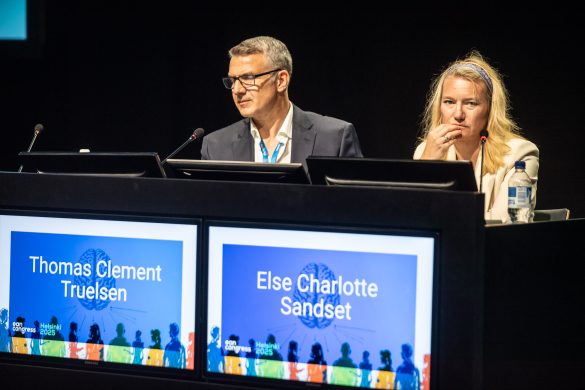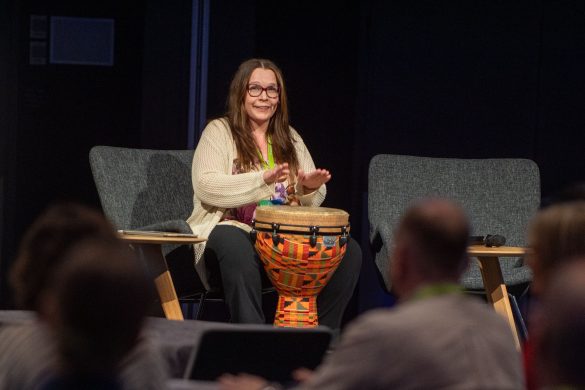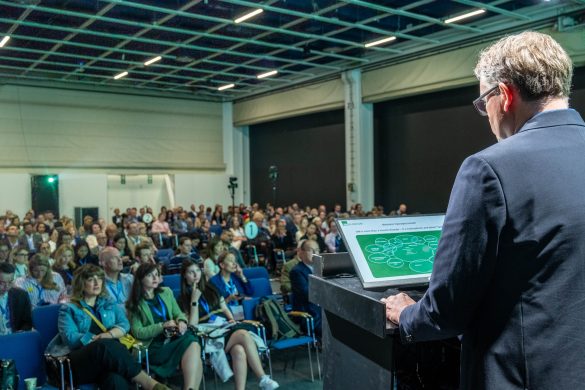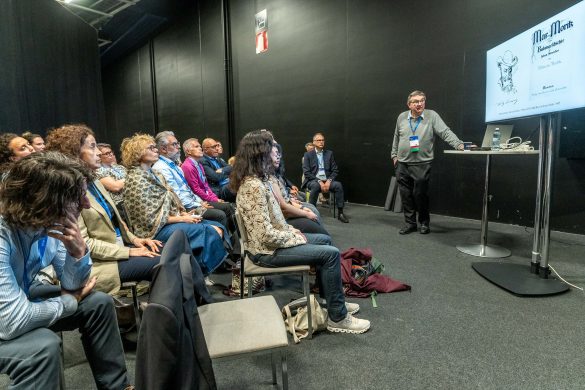by Mélisande Rouger
Top neurologists gathered to discuss challenges for women in neurology in a dedicated session on the second day of EAN 2023, currently unfolding in Budapest, Hungary.
“Our aim is to help identifying and overcoming the challenges that women may find during their academic and hospital career development in neurology,” EAN President Elect Prof. Elena Moro said as she opened the session.
“This event is mainly directed to female neurology residents and neurologists at the beginning of their career, but certainly men are more than welcome to attend to understand the challenges that women face. Actually, there’s a gentleman in the room, let’s greet him,” she added as the audience cheered.
A story from Portugal
Prof. Isabel Pavão Martins, a professor of radiology at Lisbon University, Portugal shared her experience of being a woman neurologist in the 1980s, a turbulent time in Portuguese history.
“Social events influenced very much the way we lived then. Before 1974 women couldn’t vote in Portugal. This didn’t make much difference because no one was able to vote anyway; we were ruled by a dictatorship,” she told an amused audience.
Back then, women were not able to travel abroad without their husband’s consent. Divorce was illegal, and the concept of domestic violence or harassment simply did not exist.
Then the revolution broke. “It was very peaceful,” she said. “The revolution lasted for one day and the world changed completely. For a decade, we lived in a very unstable context.”
Around that time, Prof. Pavão Martins started to study medicine and soon became interested in neurology. “My teacher was the director of the language research lab that studied language and cognitive disorders” she recalled. “It was so fascinating that I volunteered to join the lab, along with three other colleagues.”
She was the only woman to do so at the time and her application raised a few eyebrows. “Years later, I heard that my application was very much scrutinised, probably because they thought it didn’t make sense to invest so much in me, since I was probably going to marry and have children, etc.” she confessed.
She was accepted to the lab only to be assigned to study acquired childhood aphasia and developmental language disorders. “The assignment was the result of gender role bias,” she joked. “Several other women joined the lab afterwards.”
When she started submitting papers, she was advised by a male colleague to only use her initials. “That way they won’t see you’re a woman, he told me. Otherwise, you’ll never get published.”
Educational perspectives for women in Portugal were very different to what they are now. In 1960, 40% of women were illiterate, compared to 26% of men. In 1980, Portuguese women represented 10% of researchers. Today they are about 25%. “There are even fewer female editors and female editors in chief.”
The start of the 21st century saw the take-off of women in higher education. Today, more women work in STEM (science, technology, engineering) fields than a decade ago, but still fewer than men.
A 2015 PISA study on the maternal role-model effect compared the career choices of children of women who work in science. “The likelihood that women choose science seems to increase with the degree of development of the country, but seems to decrease with the degree of stereotypes in the society,” she said. “There is a lot of social pressure.”
According to the research.com 2023 ranking of the best scientists in medicine, Catarina R. Oliveira from University of Coimbra is currently the best scholar in Portugal. “She is also a neurologist,” she pointed out.
Today there is no prejudice against women in clinical biomedical research, but there are still few women in leading roles, she notes. “For example, Elvira Fortunato is our Minister of Science, Technology and Higher Education, but she’s the third woman in the role since 1974,” she said.
Stepping out of the comfort zone
She then shared practical tips on how to overcome obstacles for women who want to do research in neurology. “Choose a name and stick to it,” she said. “I didn’t, and my publications are scattered.”
Another piece of advice she gave to younger female neurologists and neurology residents is to go work in a different country. “Go train in a different context.”
Prof. Christine Klein from Lübeck, Germany and Prof. Alessandra Fanciulli from Innsbruck, Austria also took part in the session and agreed on the importance of having international cooperations.
Prof. Fanciulli, an Italian neurologist now working in Austria shared advice on how to avoid cultural conflicts.
“Coming from Rome to Tirol, I noticed some misunderstandings with my new colleagues,” she said. “But it works both ways, and sometimes you may also not understand the way others are thinking. Just be humble and put yourself in their shoes.”
To keep international cooperations up and running, it’s important to acquire soft skills at work, she added.
Other recommendations she made to women neurologists are to create a circle of trust with colleagues to share duties, but also emotions.
“When you need help, ask for it. We tend to look into ourselves to solve some problems. Male colleagues tend to delegate. Find something in the middle,” she suggested.
The gender aspect is often the elephant in the room. “Some male colleagues cannot deal with the idea that women can be successful or be dynamic enterprising women. I was once told not to make them feel anxious,” she said.
The key in this situation is to stick to one’s values. “Don’t stress yourself about it and don’t sell yourself cheaper than what you think you’re worth,” she concluded.













